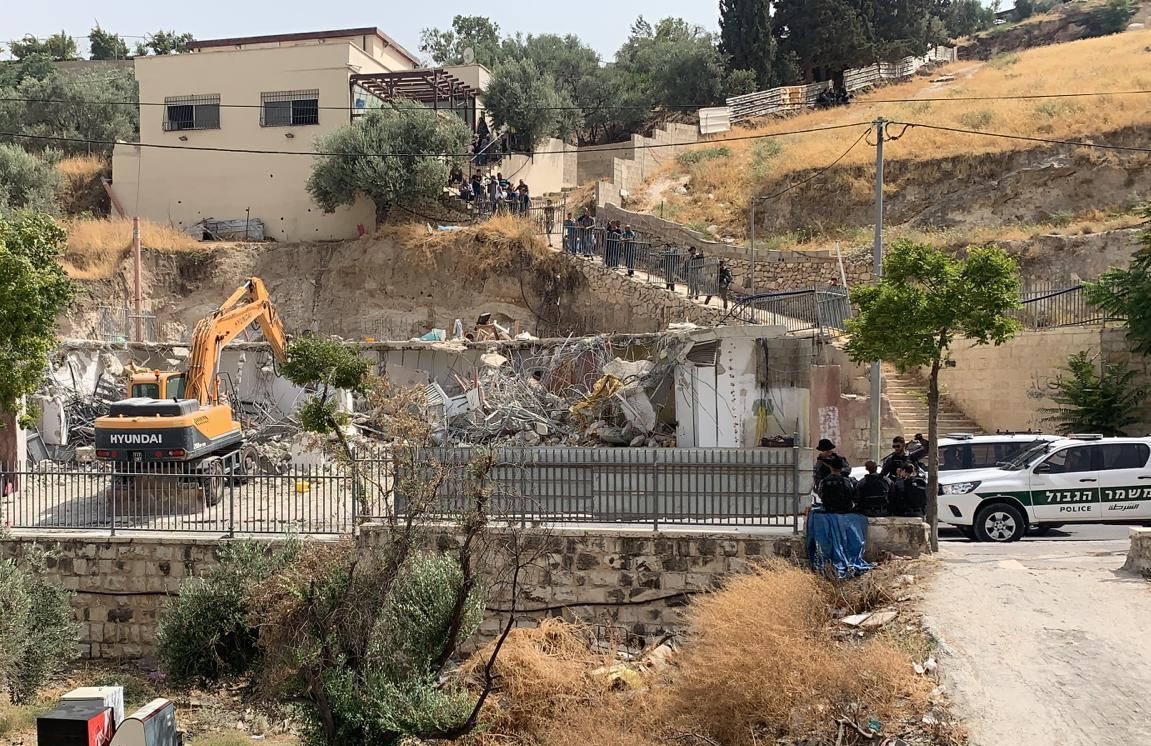“This is yet another Israeli war crime”, said MK Ofer Cassif (Hadash) after the Israel military demolished on Friday, July 19, several occupied East Jerusalem buildings constructed near the security barrier in Wadi al-Hummus, in the neighbor of Sur Bahir. Palestinians have charged that the security concerns are a pretext to push them out of the Jerusalem area, and say it is nearly impossible to receive construction permits from Israeli authorities, resulting in a housing shortage in Arab neighborhoods in the city.

Armed Israeli Border Police forces indifferently secure the site of a house demolition in Sur Baher, last Friday, July 19, 2019. (Photo: B’Tselem)
Israel’s Supreme Court last month dismissed a petition by Palestinian residents requesting the cancellation of a military order prohibiting construction in the area. MK Cassif slammed the court’s ruling at the time, saying that “The Supreme Court serves as a rubber stamp for Israel’s apartheid policy in violation of international law. The houses in Sur Baher were built in Areas A and B with permits and in compliance with every law, and their destruction meant throwing families into the street. This is another step taken by the Israeli government towards its vision of cleansing this land of the Palestinian people, a racist settler vision that exacts a high price in blood, mainly from the Palestinians, but also from the Israeli public.”
“The current Israeli government has launched a war against the entire Palestinian people. Home demolitions are only one of their tactics that, taken together, have but a single goal: to force all Palestinians out of their homes,” Cassif declared.
The United Nations also condemned the razing of the houses in a statement it issued. “Demolitions and forced evictions are some of the multiple pressures generating a risk of forcible transfer for many Palestinians in the West Bank,” the UN statement said. “Residents of East Jerusalem and adjacent areas have been particularly affected, with a significant rise in demolitions there in 2019.”
The statement warns, “Displacement, particularly for the most vulnerable, is traumatic and has lasting consequences. We join others in the international community in calling on Israel to halt plans to demolish these and other structures and to implement fair planning policies that allow Palestinian residents of the West Bank, including East Jerusalem, the ability to meet their housing and development needs, in line with its obligations as an occupying power.”
While Israeli demolitions of Palestinian homes in East Jerusalem are commonplace, typically under the pretext that the homes were built without Israeli-issued permits, the homes in question are located in Areas A and B, land under the control of the Palestinian Authority (PA), as designated in the 1995 Oslo Accords.
While most of Sur Baher is located inside Israeli-annexed East Jerusalem, Wadi al-Hummus, borders the Green Line and is technically a part of the West Bank; but when Israel began constructing the separation wall in the area in 2005, it was routed around Sur Baher so that, de facto, Wadi al-Hummus was annexed into the Israeli-controlled Jerusalem side of the barrier.
Despite the fact that residents of the area duly obtained building permits from the Palestinian Authority (PA), Israel has continued to move forward with orders to demolish the homes because they violate a 2011 Israeli military order prohibiting construction within a 100-300-meter buffer zone of the separation wall. The cases of Sur Bahir and the residents of Wadi al-Hummus have drawn widespread international attention in recent weeks, given the humanitarian and political gravity of the situation.
With an estimated population of 24,000 Palestinians, Sur Baher is one of the largest Palestinian towns in East Jerusalem, situated around 4.6 kilometers southeast of the Old City. While the total original land area of Sur Baher is around 10,000 dunums (approx. 2,471 acres), much of the town’s land has been confiscated by Israel over the years for the use of settlement construction, settler bypass roads, and the separation wall.
Following Israel’s military conquest and occupation of East Jerusalem and the Palestinian West Bank in June 1967, the Zionist state illegally annexed some 70,000 dunums of Palestinian land and extended the boundaries of the Jerusalem municipality to dozens of Palestinian towns along the border area, including most of Sur Bahir’s land. In 1995, under the Oslo Accords, the remaining eastern neighborhoods of Sur Bahir that were not officially under the Jerusalem municipality — Wadi al-Hummus, al-Muntar, and Deir al-Amoud — were classified as land controlled by the Palestinian Authority land, were divided up, being allocated to Areas A, B, and C respectively.


